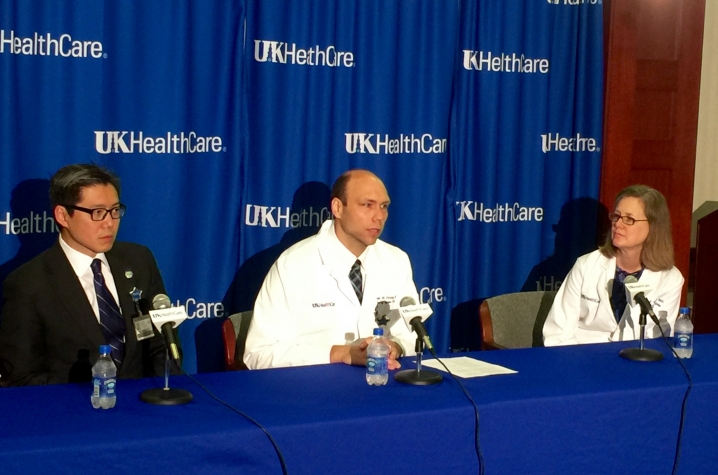UK HealthCare Provides Update on Preparedness for Zika Virus

LEXINGTON, Ky. (May 31, 2016) — UK HealthCare is urging Kentuckians to take precautions to prevent mosquito bites this summer and to be aware of travel warnings and evolving information regarding the Zika virus.
Watch UK HealthCare Experts Talk about Zika
“At the present time, the risk for infection is low for Kentuckians not traveling to areas with active Zika," said Dr. Phillip Chang, UK HealthCare chief medical officer. "However, the Centers for Disease Control and Prevention (CDC) continue to provide updates and if locally transmitted cases are found in the U.S., the risk could increase
The Zika virus disease is an infectious disease spread through mosquito bites or through sexual contact with someone with the Zika virus. Currently, Zika virus transmission is ongoing in many Caribbean and Central and South American countries. Although many people who contract Zika have mild or no symptoms, pregnant women are at high risk for complications because the virus has been linked to microcephaly, a neurological disorder characterized by an abnormally small head and potentially fatal developmental issues in newborns.
Currently, the only cases diagnosed in the U.S. have been travel-associated, meaning they were acquired while in a region with active Zika virus transmission. However, concern is growing about the possibility of locally transmitted cases of Zika if travelers spread the virus to mosquitoes in the U.S., which can then infect people who have not traveled to countries with Zika epidemics.
Also, the main Zika-carrying mosquito, the Aedes aegypti, can be found during summer months in a number of states in the continental U.S., including Kentucky.
“Currently, there is no anti-viral treatment and no vaccine for the Zika virus, so we are focusing on prevention and risk reduction and, if necessary, proper screening for our patients if Zika becomes a concern in the region,” said Dr. Derek Forster, UK HealthCare medical director for infection prevention and control.
Since February, UK HealthCare’s obstetrics and gynecology clinics have been educating patients on the risks of Zika, particularly for pregnant patients or pregnant patients with partners who travel to these areas, said Dr. Wendy Hansen, chief of the UK Department of Obstetrics and Gynecology.
“We have been telling pregnant patients to postpone travel to areas with outbreaks of Zika virus which currently is nearly all of Central America and much of the Caribbean and South America,” Hansen said. “We also are counseling and advising patients on what to do if they have partners that plan to or have traveled to these areas.”
According to current CDC guidelines, the following special precautions are recommended for pregnant women:
· Pregnant women should not travel to any area where Zika virus is spreading.
· If you must travel to one of these areas, talk to your doctor or other health care provider first and strictly follow steps to prevent mosquito bites during your trip.
· Until more is known, pregnant women with male sex partners who have lived in or traveled to an area with Zika virus should either use a condom every time they have sex or abstain from sex during pregnancy.
While the Zika virus is most dangerous for pregnant women who risk complications due to the virus, to prevent possible spread of the disease, everyone is urged to take precautions to prevent mosquito bites during the summer months.
Precautions that should be taken include:
· Wear protective clothes, including long-sleeved shirts and long pants. For extra protection, treat clothing with permethrin, chemical that when sprayed on clothing, tents, and other gear, repels insects and kills mosquitoes and ticks.
· Use an EPA-registered insect repellent every day containing one or more of the following active ingredients: DEET, PICARIDIN or IR3535.
· Use screens on windows and doors. Use air conditioning when available. Keep mosquitoes from laying eggs in and near standing water near your home.
“Although these precautions are especially important for pregnant women and women of childbearing age who want to become pregnant, we want everyone to educate themselves on how to protect their family members and friends,” Hansen said.
For more information about Zika from the CDC, go to http://www.cdc.gov/zika/index.html
###
UK is the University for Kentucky. At UK, we are educating more students, treating more patients with complex illnesses and conducting more research and service than at any time in our 150-year history. To read more about the UK story and how you can support continued investment in your university and the Commonwealth, visit uky.edu/uk4ky. #uk4ky #seeblue
Media Contact: Kristi Lopez, kristi.lopez@uky.edu




